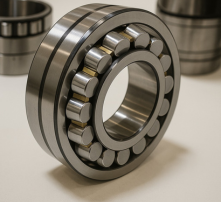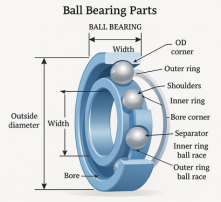If you want to purchase ball bearings in bulk, this guide is key to making cost-effective, informed decisions while securing high-quality components for your projects.
With the increasing demand for dependable parts, understanding the best practices for bulk buying is essential for businesses to optimize their procurement process.
Where to Buy Bulk Ball Bearings:
This guide covers everything from determining your quantity requirements to comparing suppliers and assessing brand reputation. Get valuable insights and learn how to make the best purchasing decisions to streamline your process and ensure the success of your applications or projects.
Purchasing ball bearings in bulk offers considerable cost advantages through economies of scale, simplifying your procurement process, and guaranteeing a steady supply.
It ensures convenience, reduces stress, and prevents operational disruptions by eliminating the chances of running low or facing delays.
Buying in bulk also allows for more suitable planning, helping you anticipate future needs and quickly address unexpected situations.
Additionally, bulk purchasing fosters a stronger relationship with your supplier, which can lead to preferential treatment, tailored service, and potential extra cost savings.

| Advantages: | Disadvantages: |
|---|---|
| Being close to your location ensures fast access to the products. | Inventory limitations can lead to stock shortages. |
| Local suppliers often offer personalized service and foster stronger business relationships. | Prices might be higher compared to online suppliers due to increased operational expenses. |
| Shorter delivery times because of the reduced shipping distance. | There might be fewer product options and varieties to choose from. |
| A better understanding of local market demands and preferences. | Relying on local suppliers may restrict your ability to explore other potential sources. |
| Advantages: | Disadvantages: |
|---|---|
| A broad selection of suppliers and products provides more options to choose from. | There is an increased risk of dealing with fraudulent or untrustworthy suppliers. |
| Competitive prices are driven by greater market visibility and competition. | Shipping costs can add to the total cost of the purchase. |
| The ordering process is convenient and available around the clock. | The lack of direct personal interaction may lead to challenges, including potential language barriers. |
| Customer reviews and ratings offer valuable information about product quality and supplier trustworthiness. | The risk of encountering unreliable suppliers remains higher online. |
| Advantages: | Disadvantages: |
|---|---|
| Potential for reduced prices by cutting out intermediaries.. | Minimum order quantities (MOQs) may be required, limiting flexibility in smaller orders. |
| Direct access to a dependable source with detailed product knowledge. | The product range may be restricted if the manufacturer focuses on specific types or sizes. |
| Opportunities for product customization or tailored solutions to meet specific needs. | Longer production and delivery times due to manufacturing processes. |
| Possibility of building a long-term partnership with the manufacturer. | Limited sourcing options, creating a reliance on a single supplier. |
| Advantages: | Disadvantages: |
|---|---|
| Price |
|
| Quality: |
|
| Delivery options: |
|
| Customer service and reliability: |
|
When evaluating options, buyers should consider their specific requirements, budget, and preferences when choosing between local suppliers, online suppliers, or direct purchases from manufacturers. Carefully weighing the pros and cons of each option will help ensure the decision aligns with the company’s supply chain objectives and overall goals.

Assess the number of ball bearings required by evaluating the specific needs of the project or application. Consider load capacity, speed, operating conditions, and future maintenance requirements.
Consulting with engineers or industry experts can provide a more accurate estimate of the required quantity. Be cautious not to overstock, as it can lead to unnecessary storage costs while ensuring enough stock to prevent shortages.
Take the time to research and compare prices from various suppliers to ensure you’re securing the best deal.
Request quotes from multiple sources and examine the pricing structure, factoring in bulk discounts and additional costs like shipping or taxes.
Evaluate each supplier’s overall value, balancing price with essential factors such as quality, customer service, and reliability.
Consider negotiating with suppliers to achieve more favorable pricing.
Opt for a well-known brand recognized for manufacturing high-quality ball bearings. Assess a brand’s reputation by checking customer reviews, industry ratings, and their history of providing reliable products.
Choose brands that have proven themselves as industry leaders with a solid track record of innovation, durability, and customer satisfaction. Established and trusted brands typically offer superior technical support and after-sales service, ensuring a seamless purchasing experience.
Consider the available delivery options and the time required to receive the ball bearings. Evaluate shipping methods, lead times, and the supplier’s ability to meet delivery deadlines.
Choose suppliers who offer flexible delivery choices, including expedited shipping if necessary. When planning projects, consider the delivery time and coordinate with suppliers to ensure the timely arrival of the ball bearings, helping to prevent delays in your operations.

With this detailed guide in hand, you’re now ready to move forward with purchasing ball bearings in bulk. Contact trusted suppliers, request quotes, and carefully review the options.
Consider quality, quantity, pricing, brand reputation, and delivery choices to make a well-informed decision. By doing so, you’ll select the best supplier, streamline your purchasing process, and ensure the success of your projects or applications.
Begin your path toward efficient and reliable ball-bearing procurement today!
Copyright © 2015 Rolls Bearing Limited All Rights Reserved Sitemap